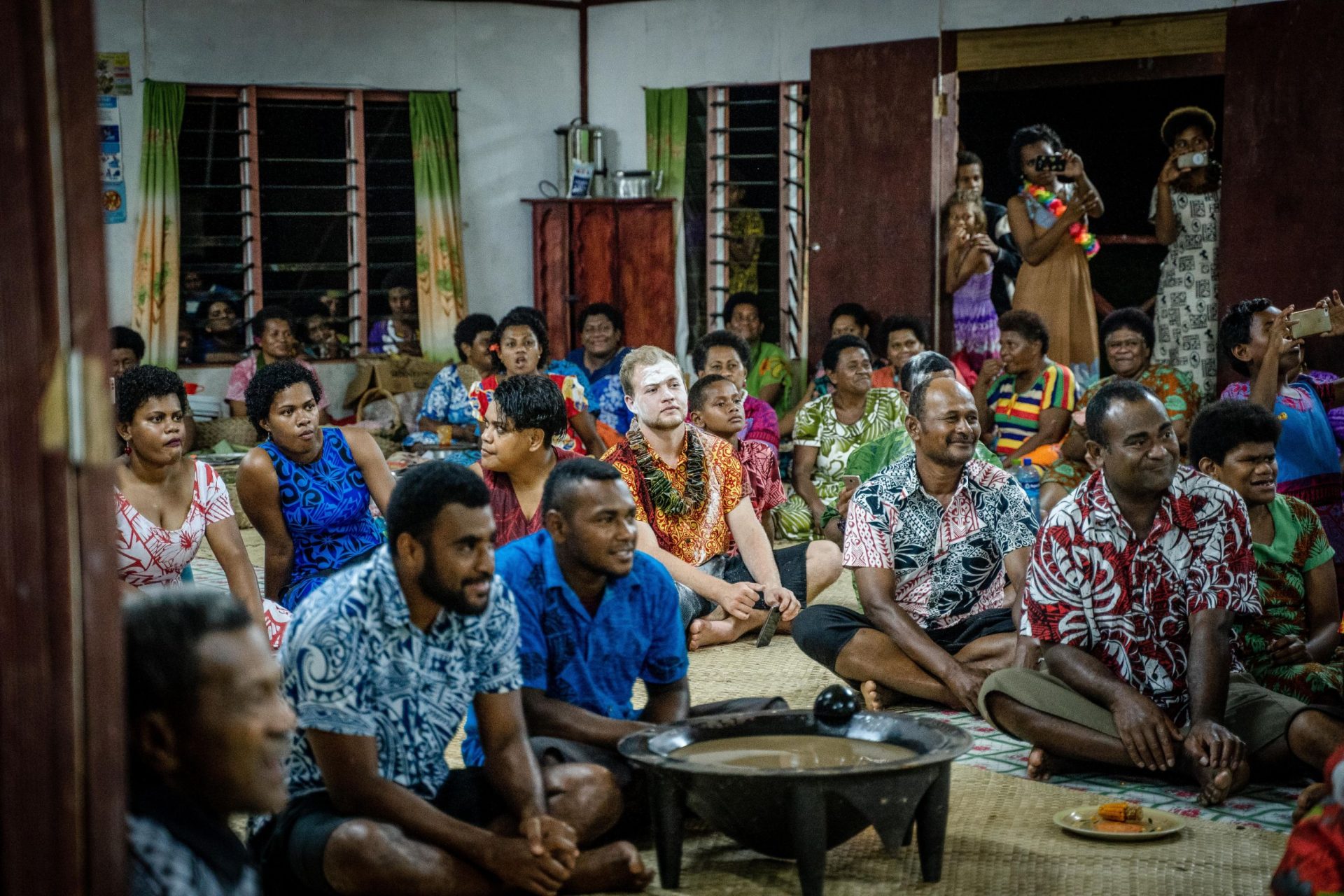Village Life
During your Think Pacific project, it is absolutely essential that you are prepared for the living in a rural location in Fiji, coming to terms with the reality of what to expect and how to be as culturally aware and respectful as you can be! In the topics below, we give you a practical guidebook into what it will be like to join a traditional village, how to properly observe Fijian customs and what to expect on a typical day within the community…
An Appropriate Approach to your Project
Culture
It is our biggest privilege to be invited into rural communities to work on behalf of our partners and the respect and appreciation of rural Fiji from anyone joining a project is paramount. We strive to have the highest standards of cultural exchange in Fiji.
To achieve this goal, we ask you to join the project with a learning mindset, adopting a humble approach to appreciating cultural differences and nuances. This not only puts you in the most effective position to genuinely learn, we believe it is essential for conducting your project ethically and ensuring as effective and sustainable impact on project as possible.
Think Pacific volunteers are sensitive, respectful and hence highly regarded in Fiji. We ask you to join your project with a passion to learn, removing any ego and manifesting a genuine curiosity and thirst to understand Fiji and Fijian life.
This is your opportunity to immerse yourself in every aspect of life. Take an active interest in local customs, values, religious beliefs, ceremonies and cultural practices. By the time you leave, you will have certainly learnt a great deal about Fiji and no doubt about yourself!
Mindset and Your Project
How do I genuinely and effectively do good in the world? If you, along with countless other previous volunteers, interns and global learners, have been asking yourself this question, and want to explore a fun little model that might provide a starting point for the answer, watch this video and use the following prompts for further discussion:
- The video talks about personal development and global development being interlinked. Do you agree?
- How have you seen these links in your own life?
- Which of the 4 quadrants (knowledge & skills, attitudes & empathy, thoughtful action and daily choices) do you most associate with “doing good in the world”?
- Why? Is there a quadrant you think most important?
- What do you think is meant by a “learning mindset”?
- Why do you think this is in the center of the model?
- Is there anything missing from the model presented? How would you answer the question yourself?
Top Tips:
- Everyone’s family/home/food is different – Embrace your unique experience and be grateful for such an authentic opportunity.
- Help your family around the home e.g. washing, cooking & water collection
- Be proactive with family activities eg. plantations, fishing and cooking
- Come with a thirst to listen and learn (set goals that are related to learning about culture, what do you hope to achieve?)
- Be sensitive with conversation – Never talk openly to others about ‘basic conditions,’ ‘poverty,’ or diet in Fiji – it can easily be overheard by the community, it may easily be miscontrued and quickly cause offence.
- Don’t openly display valuables or leave items lying around the home – keep your personal belongings in your bag.
- Never force your views, opinions and your own way of life upon your hosts. Remember when things work differently and understand biases on both sides (fundemental in any meaningful exchange!)
Challenges – Adapting to a Fijian Village
Everyone will encounter challenges when taking on a Think Pacific project, whether that is learning and practicing new skills or throwing yourself into an entirely new setting for the first time. Life in a Fijian village will present some challenges… it is beautiful, it is amazing but it is very different from what we may be used to overseas. See below for some awareness points when it comes to living in a rural Fijian village.
General Amenities
By ‘Western’ standards, living conditions in a Fijian village are relatively basic. Please be prepared for a simple and comparatively tough lifestyle, with cold bucket showers located a short walk away from your home and very basic toilet facilities.
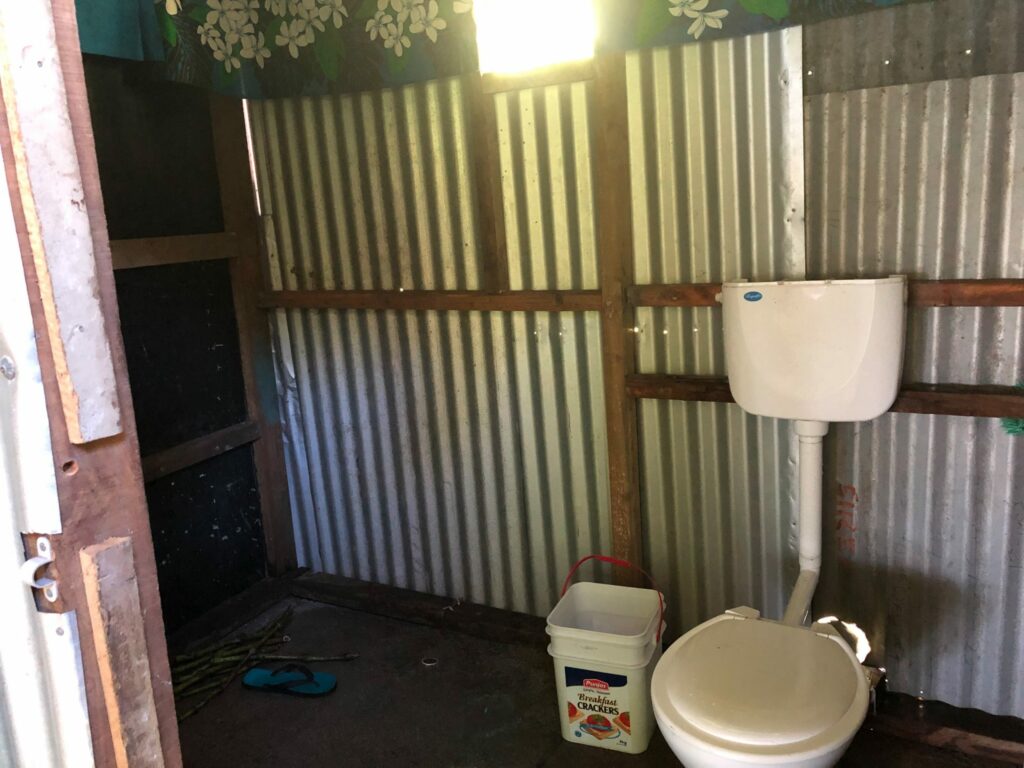

You will undoubtedly feel a sense of culture shock in your first week in Fiji. Fijian culture is beautiful but the lifestyle will be very different from the one you may be used to and the unfamiliar surroundings can leave you feeling a world away from home.
It is completely normal to feel uncomfortable and out of your depth for the first few days. Don’t be disheartened, remain positive, speak with your leaders if necessary and keep throwing yourself into the experience and the different customs and daily activities. The more you become familiar with people and culture, the more familiar the whole experience will feel!
Trust us when we say that there really is nothing like a Fijian village. You may struggle with different aspects of life to start with, but by the end of the project we find our volunteers look back upon the challenges with so much pride.
Visiting rural Fiji just wouldn’t be the life-changing experience it is, without having the tough times and culture shock to begin with. By the end of your project you will feel as though the community is now like a family to you. It is this transformation from feeling homesick at first, to feeling part of the Fijian community by the end that our volunteers come to cherish most from their project.
Within the Household
- Personal Space
This is often an overlooked challenge for people that join our rural projects. Due to the communal nature of a Fijian village, the large families and comparatively small houses, it’s safe to say that personal space does not exist. Fijian houses are usually one big living space divided into separate areas by curtains:
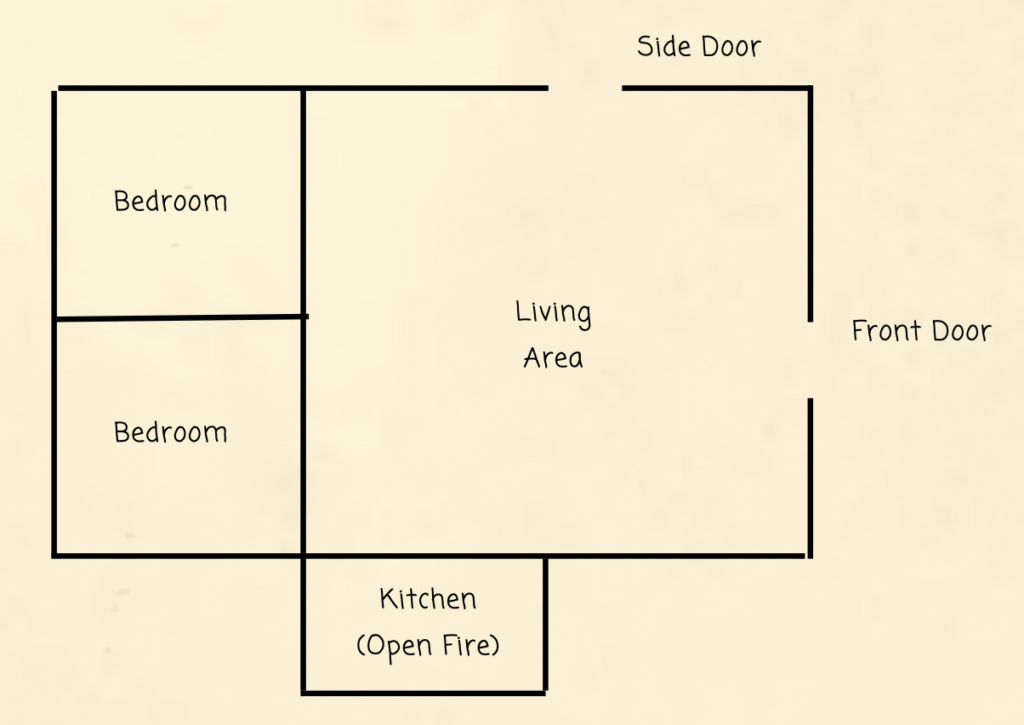
Because of this, within the households and even in sleeping arrangements you may feel like there are more people around you and closer to you than you would usually be used to. Houses have an open door policy in villages and extended families are large so expect to have different people coming in and out of the house throughout the day.
2. Sleeping Arrangements
It is common in Fijian households to have one or two beds in a bedroom area. It is likely that your host family may offer up beds to you in a show of famous Fijian hospitality and if it happens there is nothing you can do to stop them! Even if you decline, if the offer has been made, no-one else will sleep in those beds. This may be likely but it should not be our expectation.
However, it is commonplace for the community to sleep on the floor. This is a standard expectation that we communicate to families that put themselves forward to host you, that you will be sleeping on a thin mattress on the floor. This may be a challenge for you but it is important to expect it.
3. Sitting on the floor
This sounds like a funny one for us to be advising you about but it often comes back as a challenge for people who adapt to living in a Fijian village! You will spend all your in a Fijian household on the floor, there is rarely any furniture in a rural household but even if there, out of respect they are rarely sat on (you would be sitting at a higher level than everyone else). You will relax on the floor, likely sleep on the floor, meals are eaten on the floor.
A lot of this time, especially at meals and during ceremonies, you are likely going to sit cross-legged or at a sidewards slant. It may be worth getting some practice in!
4. Bugs and Rats
If you are someone who is struggles with bugs… this might be your mountain! As you will be living in a rural and likely jungle environment, there are plenty of creepy crawlies that you might encounter. Cockroaches are not uncommon as are very large moths. Mosquitos are also something to prepare for.
Although it is not expected that your Fijian village will have rats, it is not uncommon. If you have any concerns about the above, let your leaders know, they are equipped and can help out.
5. Animal Welfare
The treatment of animals in a Fijian village may be very different from what you are used to. On a base level, you are in much closer proximity to the livestock reality where animals are reared and farmed locally and then slaughtered for meals, very different to picking your meat up from the supermarket!
On another level, animals are rarely kept as pets or at least treated as them – animals owned in a Fijian village serve a purpose and their disciplining and training may be on the firmer side. It is not uncommon for dogs to be hit for example.
6. Domestic Violence
This is not a cultural factor in Fiji and domestic violence unfortunately happens all over the world. However, when you are placed into the heart of a Fijian home, we do have procedures we follow as an organisation should you ever encounter violence in the household between family members. Hitting children or any others abuse towards any member of the family is illegal in Fiji and if you ever encounter anything that makes you uncomfortable or treads into the realm of what you would deem to be abuse, raise it with your team leaders and we will follow our procedures of reporting to our partners if necessary.

Health
Due to immersing yourself in a completely different environment, with a very different climate and adapting to other environmental factors in the village, it is highly likely that you will encounter sickness during the first few days of your project. This is normal as your body encounters new foods and waters and often after the initial illness, your body adapts for the remainder of the project.
- Diarrhoea and Vomiting
This is very common for people joining a project… the expectation must be that everyone travelling to Fiji will get the shits! Loose stools are much more common than vomiting but in either case, it is important to sip fluids and keep eating food (bland carbs are best). This may happen due to the change in diet, water or even climate/timezone. Usually, this clears up in 24-48hours but if you are ever concerned, your leaders will be on hand.
2. Constipation
The other end of the spectrum from diarrhoea but again commonplace due to the carb heavy diet. Drinking plenty of fluids is important and making sure to have constipation relief as an addition to your medical supplies brought onto the project.
3. Mosquitos
There are plenty of mosquitos in Fiji and cannot avoid being bitten by them during the day. Deet and anti-mosquito sprays really help during the days and evenings and we recommend bringing mosquito nets for the nights. Mosquito bites itch and this may be a challenge, what is incurably important however is not to itch them. Once the skin is broken, you are susceptible to infection in a tropical environment.
4. Mental Health
Due to the drastically changed environment and the transition into a Fijian village (alongside other challenges), it is very important that you are open and honest about your mental health. Even if you are someone who has not previously experiences a mental health episode, this is a new and challenging experience that you will not have encountered before. Always speak to your leaders if there is anything you would like to discuss
Top Tips:
- It’s normal to feel a little overwhelmed at first.
- Keep positive, it will get eaiser and by the end of the project you will be incredibly proud!
- Be open and pro-active in sharing concerns with your leaders.
- Take every opportunity to be involved in community activities.
- Refrain from spending time on your phone or trying to call home, it often only makes homesickness worse.
- Use the support of your leaders, your team and your family.
- Be mindful of all the amazing experiences and opportunities around you and that you may never get to be here again.
- Remember that Think Pacific is an experience that is reflective and wouldn’t be as rewarding if it didn’t come with challenges to overcome.
As with any cross-cultural encounter, you are going to be engaging with and living alongside people with different cultural backgrounds to your own and who may have different perspectives on life to yours.
1. Traditional Gender Roles
Within a Fijian village, there are quite obvious divisions in responsibilities between male and female community members. Within the family unit, this may become particularly clear. Men are generally expected to do manual work; the long trips to the farm, extended days fishing, hunting, etc. Traditionally, women in a Fijian village are far more domestic; cooking, cleaning and looking after the children. In the village setting, men will obtain the higher positions in traditional authority roles in a village and will likely have a louder voice on what change occurs and on general village decisions. This dynamic can be seen explicitly within customs and ceremonies or communal meals, the men sitting in ‘higher positions’ with the women sitting behind for example, or men eating first and women eating after.
Culturally, reasons for this are mixed. Fiji’s pre-Christian culture was heavily patriarchal and not much changed with the introduction of relatively conservative strains of Christianity.
This may feel very different from experiences in societies you have grown up in, but please understand that this is fundamental feature of current rural Fijian lifestyle and village polity. The perspectives of Fijian people may be very different from your own and often where some of our volunteers feel injustice, they may be projecting their own views onto others without providing a chance for the other to respond. If traditional gender roles in the village makes you feel uncomfortable, we ask you to understand that it is not your responsibility to change them and we ask the deepest respect from you for the perspectives of those who have invited you into their lives.
The experience of individuals who join our projects does not change based on your gender; we ask that everyone joins in with the chores, everyone eats together and everyone has the same opportunities. The community know this and are more than willing accommodate! It’s a cross-cultural encounter. If anyone ever asks your perspectives, definitely share them openly, honestly but respectfully.
2. LGBTQ+ Perspectives
Sexuality that is outside of heterosexuality, for the most part, is not openly common in a rural Fijian village and may be a taboo subject for Fijian people amongst each other. This does not change anything about how we communicate the subject to the village pre-team arrival and it does not change the way anyone on a Think Pacific project will be treated. Community members may be curious to ask more, or openly learn about a different perspective, and be open and honest in your response! Some questions may come across as blunt but they will never be intended to offend, English is a second language in the village and Fijian conversation is generally to the point!
As with each category here, we address the subject and its treatment during community prep-visits and the community will be aware that the international team may have different perspectives from their own… but its all part of the cultural exchange.
3. Non-binary
Identities which are outside of the gender binary are also not openly discussed at community level and will often be a new and interesting thing for communities to learn about. Village members may have different views on the subject but again open conversations are always valued and everyone comes away from them having learnt something.
If you are somebody who identifies as non-binary, you may have to have a few discussions with your leaders and our team prior to entering the village about your own personal preferences when it comes to clothing, living arrangements and general experience in the village. Categories such as clothing options, especially formal wear, are divided between exclusively male and female in the village and we will pair volunteers in households during their stay according to gender. Once we are aware of your personal choices, we can then communicate this to the particular family you are staying with to inform them of the situation and arrangements. This is always warmly received.
4. Racism
As with the categories above, community members in the village will never intend to offend but may perpetuate topics in a way that is unintended. Words in the English language that first-language speakers will fully understand to be offensive can occasionally crop up in discussions in the village. These words may have been commonplace in the early 21st century when English was first being adopted by rural communities and dated with very little challenge at a community level. An example can be ‘the N word’ which is occasionally used in passing conversation in a village.
We address this during pre-visits with communities and we have a zero tolerance to racism. However, we cannot realistically expect everyone in the village to get it right 100% of the time with very new encounters, if you ever hear anything that you find offensive in the community, please speak to your team leaders.
5. Religion
The vast majority of indigenous Fijians identity as Christians. In rural villages in Fiji, the predominant strain of Christianity is Methodism and this makes up a fundamental part of lifestyle in the village. Everyone attends church on Sundays and often during the week, prayers are said before any meal and some families even host small devotion session during some evenings. This is a fundamental part of contemporary rural Fijian culture and it is an amazing thing to experience in your cultural immersion. But there is of course no pressure to join in on any situations you do not feel comfortable joining.
Within the households and within the community, village members may be very keen to share something that is incredibly important to them but within discussions about religion, again, feel open about respectfully expressing your beliefs as part of a two-way understanding. Be aware of how your words will comes across and always be open to hearing another perspective.
Even if you are not a Christian, attending the village church on a Sunday is something we encourage as a unique experience and a community event.
Top Tips:
- If are ever seriously offended or uncomfortable with a situation, let your leaders know
- Approach the entire experience with an open mind and a real willingness to understand others
- Communicate openly and honestly in what is a cultural exchange experience
Climate in the Village
Fiji has a South Sea tropical climate and is very warm all year, with temperatures averaging 28 degrees Celsius.
Fiji’s ‘wet season’ or ‘summer’ is from November to April. This time of year receives the heaviest rainfall but also the hottest temperatures. The official ‘dry season’ or ‘Fijian winter’ is from May to October, when there is usually less rainfall, lower humidity and slightly milder temperatures. Typically, weather does vary somewhat depending on where you are in Fiji but you can almost guarantee, within the village, it will be hot and sticky.
Whichever time of year you are visiting Fiji, always prepare for high temperatures and pack high factor sun cream. It is also essential to prepare for tropical rain showers and ensure to pack a lightweight but good quality rain coat and some suitable footwear for muddy conditions. See below for our top tips:
In the Village
One thing to prepare for is rain! Due to Fiji being in the tropics, it is usual for there to be heavy downpours amongst hot sun during the day (usually in the afternoons). This means that during your time in the village, if there is a heavy period of rain, you can expect the village to become quite muddy. You may be reading this now and thinking that all sounds fine, but really consider preparing for this to be a challenge as after two weeks of heat, sticky weather and rain, it is completely acceptable to feel it is a challenge on top of everything else.
Because of this year round heat, most houses are constructed very simply to be airy and spacious with simple shutter-system windows that allow a breeze to draft through the house. Don’t be surprised if the front door is left wide open all day and security looks very basic to non-existent on the house itself, open door policy in a village means that there is an incredible amount of trust! These houses can get warm during the hight of day and it may be difficult to escape the so please be prepared for this and drink plenty of water.
Hand-woven mats on the floor do help the house remain cool and houses usually boast a few woven fans to help out if you just want to cool down!
Around the time of year that you will be visiting Fiji, the evenings will rarely ever drop below 18ºC. This means you will not need thick duvets or heavy duty bedding. Thin Sleeping bag liners are always a good option for this.

If, however, you are heading to the highlands, you can expect night-time temperatures to drop a little lower. It is not uncommon for fog to sweep through a village in the early mornings in the mountains so potentially think about bringing a couple of jumpers for the night, Fijian houses are built for heat!
Natural Disasters
During the time of year that the vast majority of our projects take place, cyclones, tsunamis or other tropical storms are very unlikely to occur; the dry season means that volatility of climate is far less extreme. In the wet season, however, due to Fiji’s geographic position, tropical cyclones and severe flooding are unfortunately common.
Although you won’t be experiencing these yourself, the after-math of these events can be clear to see in Fijian villages. Houses and other amenities are made with cheap materials in the anticipation that they may be rebuilt quickly in the event of a natural disaster. Rural buildings may be robust but built for purpose rather than luxury because of this.
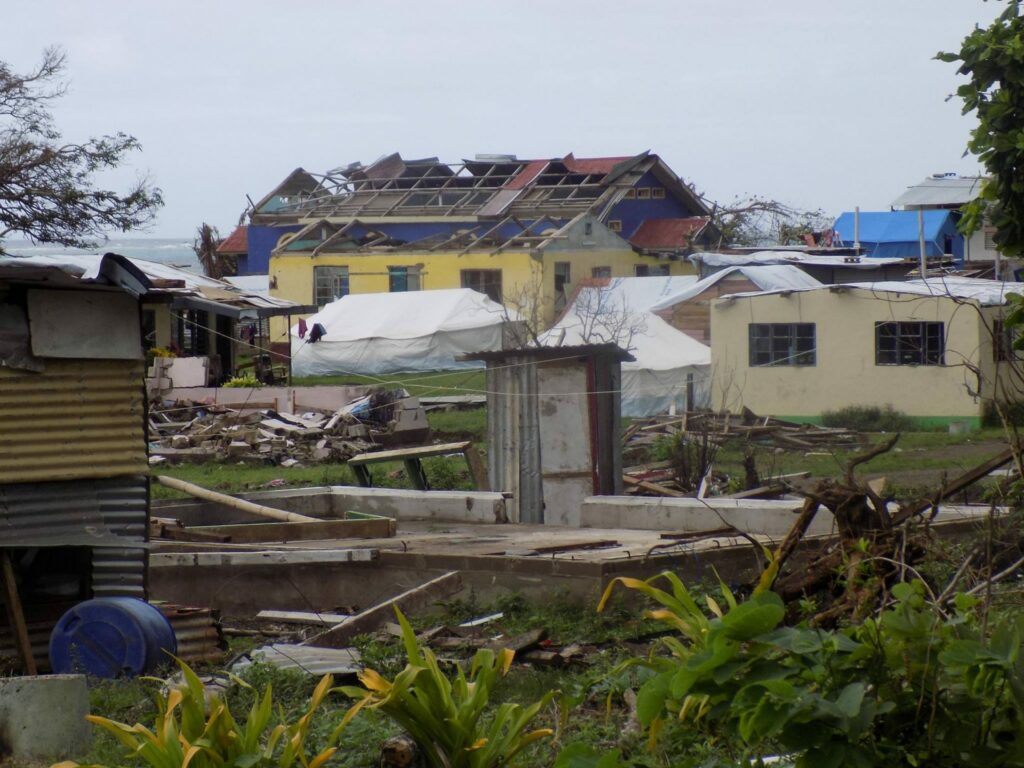
Top Tips:
- Ensure you have a high factor sun cream
- Try, when possible, to stay out of the midday sun
- Pack a raincoat
- Pack suitable footwear for muddy conditions
- Pack at least x1 hoodie or jumper for cooler evenings
Your Hosts in the Village
Living communally is a core component to any Fijian village and although strange to get used to at first, this way of life is often one of the highlights for those who experience it on their project. It is our biggest privilege to be hosted by families in the community during the project. The Fijian families will treat you no differently to anyone else in their family, it is something we request of them due to not wanting to put undue pressure on them to host in any particular way aside from normal day-to-day life, but also we couldn’t stop them – it is a natural part of famous Fijian hospitality! If you are lucky, you may also live with a family who has children. Children in the village are always so intrigued by the arrival of our volunteers!
You will not be living alone with a family during your stay, you will always be paired up with someone else on the team.
Your family with be the beating heart of your project experience. They have allocated themselves to host you once the project has been confirmed and they will probably be just as nervous as you about the experience! When meeting your family for the first time, give them a big warm smile, confidently introduce yourself and begin learning about how the family operates.
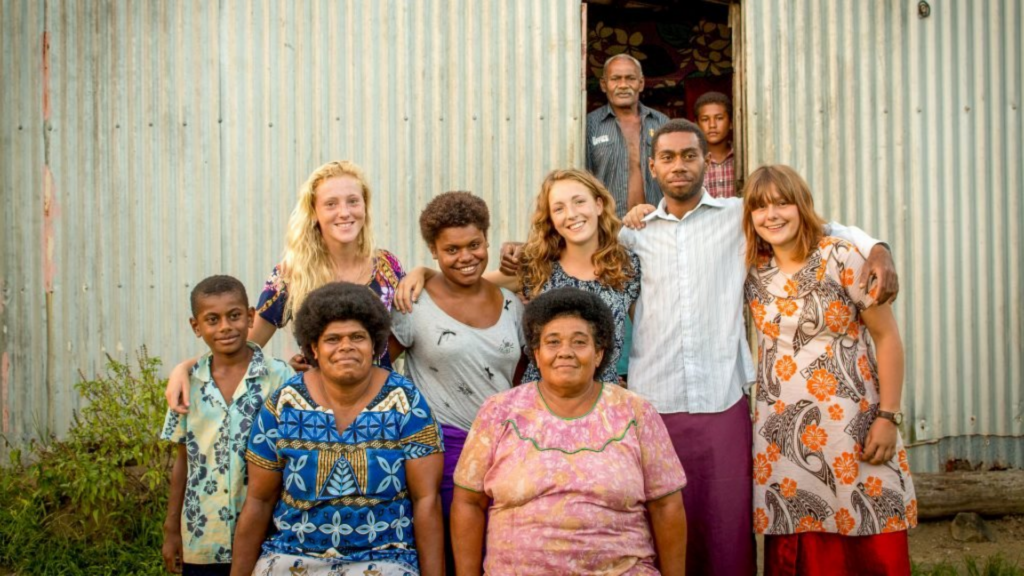
Some Differences
Fijians really do live together closely. Your house is the living space for your family, essentially acting as a place to sleep and daily life takes place within the village setting, with toilets, showers and often cooking facilities being located outside. Every house is different and you will be staying with a different family to lots of your team members. Be grateful for the unique experience that this provides you – the family will cherish the time they spend with you so make sure to get as much as you can out of the experience during your project.
Houses in the village are relatively small, often with just one room which is a communal space. Thin curtains divide your bedroom and the rest of the family, who will usually sleep on the floor. Please be prepared for this lack of space and privacy.
You’ll be living at your family’s pace, eating breakfast in the morning at around 7:30 and dinner in the evenings after a busy day. Heads up, your family may be awake much earlier than you, with pots and pans clanging at around 5:00am in the morning.
Top Tips:
- Try to learn everyone’s names on the first day.
- Make sure to ask questions about anything you are unsure about, your family will be more than happy to help out.
- Your family is your window into learning about Fijian culture and rural lifestyle, do not take them for granted and make sure to ask lots of questions!
- You will not be expected to bring any gifts at all, but in our experience, photos of your life overseas and maybe even a photo of you would be a lovely thing to bring… be prepared for that photo to go straight on the wall and not leave it for many years to come!
Food in the Village
Food is another subject in the village setting that may feel a million miles away from home. In rural villages, subsistence farming and fishing is a means of daily existence. Because of this, your diet will be heavily influenced by the location the village finds itself. One thing is for certain however; the communities work extremely hard to grow, prepare and provide volunteers with their meals.
Fijian cuisine is representative of the many cultural influences that have touched the islands throughout history. The flavors of Western, Chinese, Indian, Polynesian, and Melanesian cultures are all present in the meals of modern Fiji.
As one might expect, in rural areas, seafood is prevalent in the Fijian diet. Other mainstays include beef, pork, poultry, taro root, leaves, yam, and breadfruit. Tropical fruits such as guava, mango, banana, lime, and pineapple are popular, as is coconut milk, which is used in a variety of recipes. Common spices and sauces include garlic, ginger, turmeric, coriander, fenugreek, cumin, soy sauce, and chili peppers.
Some Staple Ingredients
Food in rural Fiji is carbohydrate heavy, so expect plenty of root crops such as taro and cassava.
In coastal locations, Fijian’s eat lots of fish and many meals will consist of fresh fish (usually served with the head on), local vegetables and rice.
Meat is a rarity and generally only brought out on special occasions. Indian curries, rice, dahl and roti are common due to influences from the large Indo-Fijian communities in Fiji. Fried foods are becoming more and more common in villages. Fijians also have a very sweet tooth, and love to eat cakes and sugary tea.
Please be prepared that there is not a great variety of food within this rural diet and meals can seem repetitive, heavy and basic. There is often limited fruit in the villages as they are harvested on a seasonal basis and rarely farmed, so it is a good idea to supplement your diet with multivitamin tablets.
If you feel you may take time to adjust to the basic diet, you may wish to bring energy bars from home to supplement your diet in the first couple of days.
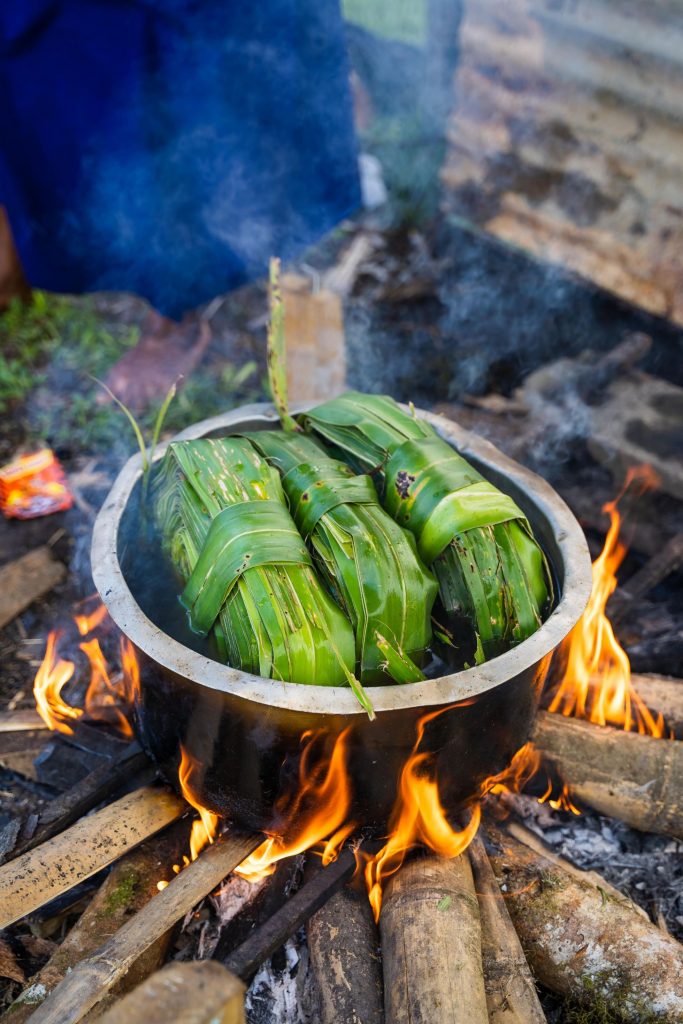
We ask you to be very sensitive to the host families and understand the effort and care that goes into preparing food for their guests. We advise you to try all foods offered as this is part of the experience of immersing into Fijian life. If you eat all the foods on offer then you will achieve a good balanced diet. The food may feel a little repetitive quickly whilst on project, try to remember it is only for a few weeks and the experience is about living in the authentic Fijian lifestyle!
If you are struggling at all with the food, don’t hesitate to speak to our leaders for advice. Think Pacific funds each hosting village so that our teams are absolutely no burden on the local resources. However, it is important from a cultural experience and also your integration that our teams eat traditional foods and we ask the villagers to keep the meals traditionally Fijian.
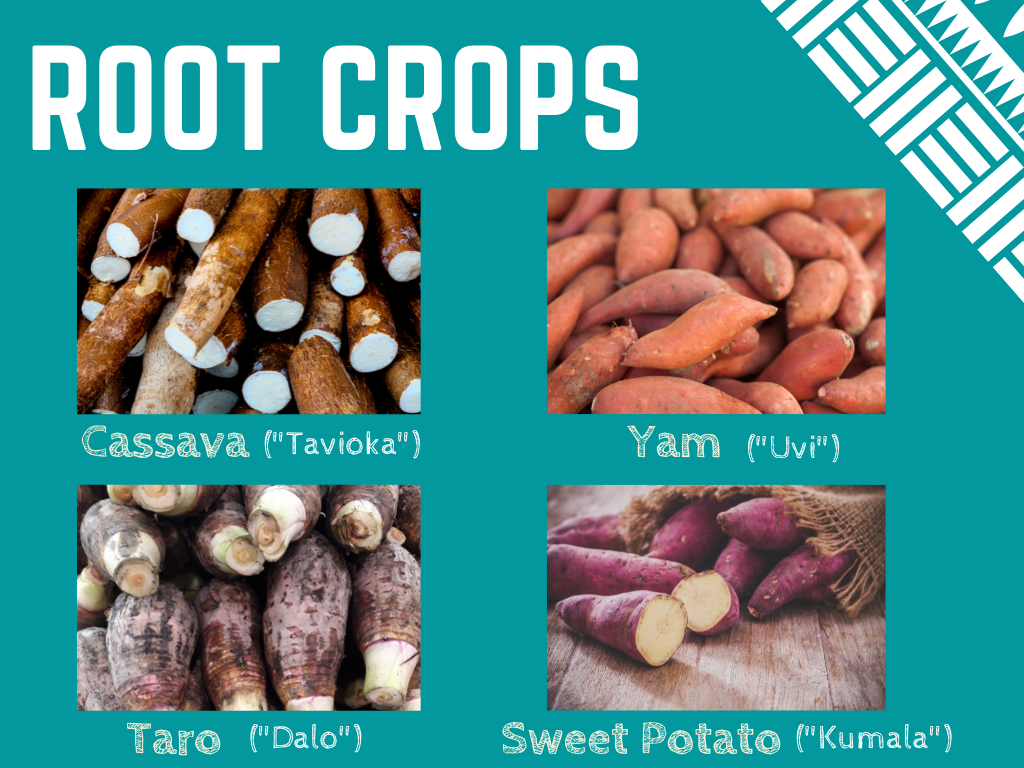

Food Preparation
Food preparation in a village is generally conducted by the mother of the household. It will very likely not be the case that the family use a gas stove or an electric oven; in rural locations, an open fire is used in a kitchen usually located next to the main house, supplied regularly with firewood and using large metal pots to prepare the meal.

This is time intensive and we’d always suggest that you get involved with the preparation of dinner as much as you can – you’ll no doubt be met with “Oh no, don’t worry, I’ve got it!” but if you persist it is a great opportunity to learn more about Fijian culture, genuinely help out and its a golden opportunity to have a good chat with your family. They will be very grateful.
Food cooked over an open fire like this also has a unique smoky flavour, very different from the food you can expect in the resorts and cities!
Lovo
If you’re lucky, you may get to taste a meal from the Fijian lovo, a famous Pacific method of cooking food. A lovo is essentially an underground-oven and it is an ancient technique of preparing food. This is generally only reserved for special occasions due to the time and resources that go into its preparation but the result is incredible… anything that goes into a lovo comes out absolutely DELICIOUS.
Watch the video below on how it is done and take some notes to impress your Fijian family with some knowledge upon arrival.
Etiquette
Fijians will eat seated on a mat on the floor, and will eat with their fingers rather than knives and forks. There may often be many different people at your home for lunch and dinner. In Fiji it is custom to invite anyone who is passing into the home to eat. Always remember that prayers will be said before you start to eat. The whole village comes together during celebrations and ceremonies to cook and enjoy communal feasts, this is common on Sunday after church services.
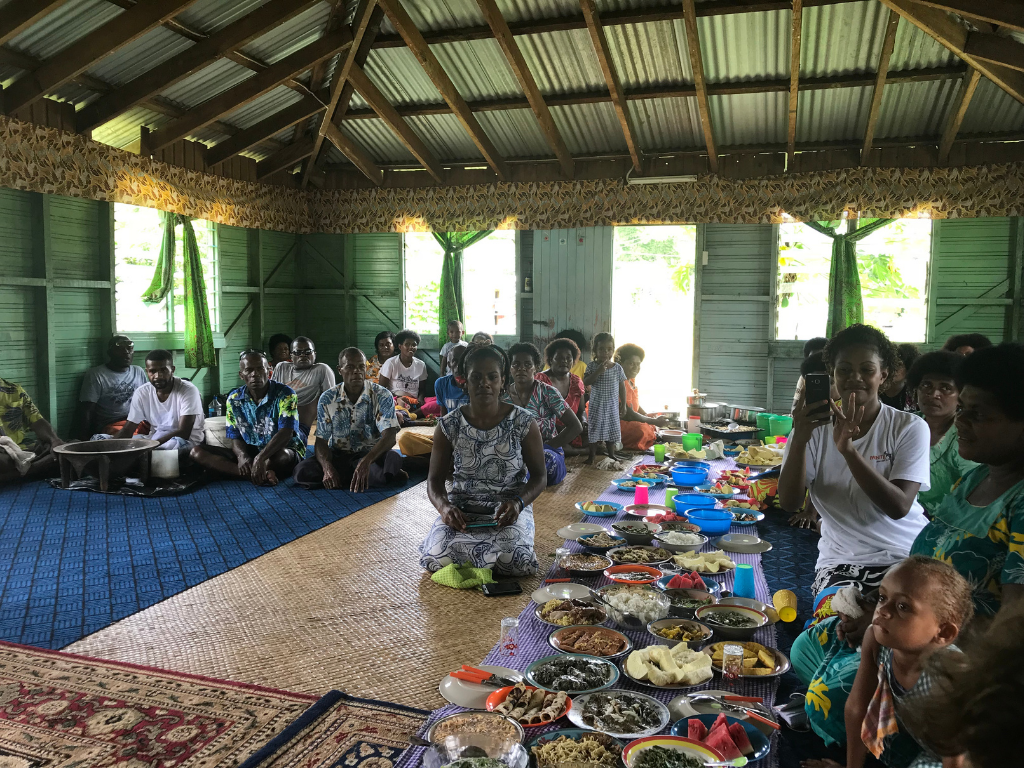
You will eat with your own Fijian family, they will provide all of your meals in the community. Please be prepared that portion sizes can be very large! Fijians eat big and to eat well in the Fijian perspective is equated to being happy and healthy. This leads to one cultural difference that often arises on project being the tendency of Fijian families to say that their guests are ‘looking fat’! This, in their eyes, is a compliment and is for the most part entirely not based on the physical reality. Even when volunteers have lost weight, the phrase may come out as an expression of how well they are adapting to rural lifestyle or how happy they look. Please try not to take it personally!
Top Tips:
- ‘Masu’ before meals and snacks – remember Fijians will pray before meals
- Take multivitamins to supplement your diet.
- Adopt a ‘Food is Fuel’ attitude if you find things tricky – You need to eat to stay healthy and try all foods and a balanced diet to maintain energy levels.
- ‘Refrain from Food Chat’ – Be sensitive to conversations with fellow students about food you are missing, how food differs, what you dislike, what you are most looking forward to eating when you leave etc…
Language on Project
In an indigenous Fijian village, the mother-tongue is the Fijian language. In Fiji, there are over 300 different dialects of Fijian language alone! Although, despite all the dialectical variations, the ‘Bauan’ dialect, or more officially known as ‘Standard Fijian,’ is generally understood and spoken by all indigenous Fijians across Fiji.
However, English is also an official language in Fiji and all schooling in Fiji is conducted in English, it has been ever since the early 20th century; this has its roots in Fiji being ceded to the British Empire in 1874 but since Fiji has become independent, it’s a system that remains for the most part due to practical reasons (tourism being 40% of GDP for one). This means that pretty much everyone speaks English in Fiji.
Fiji-hindi is another official language and spoken by the demographic of Fijians of Indian descent, but when one party speaks Fijian and the other speak Fiji-hindi (in urban areas for example), English is the common ground! This means that for you on project, we are not expecting you to learn Fijian and there is no need to work through translators. You may have a member of the older generation who doesn’t speak to much English in the household but there will always be someone younger nearby who can translate!
But this doesn’t mean that you shouldn’t try to learn as much as you can; learning about a language is fundamental to learning about any culture and the gesture of committing yourself to learning the local language speaks far beyond the words you’ll be able to say! It will seriously boost the respect you will receive. To give you a bit of a head start, we’ve thrown together some key phrases you may use on project to get under your belt!
Pronunciation
Let’s make sure you’re saying the words right though! Once you know what a letter sounds like in Fijian, it will never change… this means you can probably read it without understanding a word:
a- æ (Gap)
e- e (Elephant)
i- i: (Free)
o- ɒ (Hot)
u- u: (Hoop)
g- ng (Hang)
q- ng (Anger)
b- mb (Bamboo)
d- nd (Hand)
t- ch (Child)
c- th (Feather)
ai- aɪ (Bite)
au- aʊ (House)
ei- eɪ (Bait)
eu- eu: (Eh-oo)
oi- ɔɪ (Boy)
ou- əʊ (Toe)
iu- i:u: (Ee-oo)
The stress of the word generally comes on the second to last syllable in Fijian. But I think you’re ready to go:
Phrasebook – Some Useful Phrases in Standard Fijian
The Basics
Bula – Hello
Moce – Goodbye
Vinaka – Thank you
Vosoti au – I’m sorry
Tilou – Excuse me
E sega ni macala – I don’t understand
O kila na vosa vakavalagi – Do you speak English
Io – Yes
Sega – No
Sota tale – See you later
In the House
Kana – Eat
Gunu – Drink
Dabe – Sit down
Au via kana – I’m hungry
Mai – Come here
Au sa mamau – I am full up
E vica na kaloko? – What is the time?
Vinaka na kakana – Thank you for the food
Au sa lako lai moce – I’m going to sleep
Sota tale ena mataka – See you in the morning
Yadra – Good morning
Cava na vakaviti ni… – What is the Fijian for…
Greetings
O cei na yacamu? – What is your name?
Na yacaqu o… – My name is…
O yabaki vica? – How old are you?
Au yabaki… – I am… years old
O iko mai vei? – Where are you from?
O au mai… – I am from…
Tokani – Friend
Au taleitaka na… – I like…
Vakacava tiko? – How are you doing?
O tiko ike? – Do you live here?
In the Village
Cava na yacana qo? – What is this called?
Au rawa ni veitaba? – Can I take a photo?
Au sega ni kila – I don’t know
Dina – True
E kosakosa – It’s noisy
Vale – House
Vuvale – Family
kakana – Food
Mai ti – Come in for some tea
Na draki – The weather
Travel
Rawa ni o kauti au I – Can you take me to…
E voleka? – Is it close?
Ya vica na kena I sau qo – How much does this cost?
I lavo – Money
E rawa niu taubale kina? – Is it possible to walk there?
Vosa mada vakamalua – Please could you speak more slowly
I vei na – Where is the…?
Au via lako lesu tale mai – I’d like a return ticket
Wawa – Wait
Au vaqara – I am looking for…
Unique Concepts in Fiji
There are concepts that exist in Fiji that do not exist anywhere else in the world. These concepts relate closely to traditional approaches to societal flourishing and act as the underpinning foundation that ties all Fijian customs and traditions together. See below for just a few and how they relate to your experience on project…
Vanua
This concept is HUGE and all encompassing in Fijian culture – it is not an understatement to claim that vanua is a central component to all facets of indigenous Fijian culture and customs. It is a complicated but fundamental sociocultural, hierarchical and spiritual concept that is unique to the Pacific, being particular prominent in contemporary Fiji; it plays a central role as the epicentre and explanation for indigenous Fijian culture and is arguably the means by which Fijian customs and identity are maintained in Fiji despite a host of new influences… it is like the glue for every aspect of Fijian tradition.
Put very simply, vanua is essentially about how people relate to the land, each other and the world. Ownership of land is integral to every tribe, clan and family unit and we would seriously recommend asking about this when you are in Fiji, it’s hard to come to an understanding of Fijian culture without it.
“The vanua is the living soul or human manifestation of the physical environment which the members have since claimed to belong to them and to which they also belong. The land is the physical or geographical entity of the people, upon which their survival… as a group depends. Land is thus an extension of the self. Likewise, the people are an extension of the land. Land becomes lifeless and useless without the people, and likewise the people are helpless and insecure without land to thrive upon.”
Asesela Ravuvu. Vaka i taukei: The Fijian Way of Life, 1983, p. 76

Kerekere
The closest literal translation in English is “request”, but the Fijian concept of kerekere can best be described as ‘unconditional giving’. Fijians are used to living without personal belongings and their culture is based on sharing all goods. Consequently, in the village, people may ask you for things – from a T-shirt to your IPod. If you do not want to give an item, merely say that you cannot do without it, but be sensitive to people’s lack of material goods. Similarly, be careful not to admire anything in the Fijian home too closely, as your hosts may feel obliged to give it to you!
Following along these lines, there is an unspoken ‘open door policy’ in Fijian villages, meaning the household door is literally left open all day and anyone and everyone is welcome inside. This is a lovely thing, but it does mean that if you have any valuables on show, particularly when there are children around, it’s probably not a good idea! If you do have any valuables with you on project, make sure they are out of sight and notify your family.
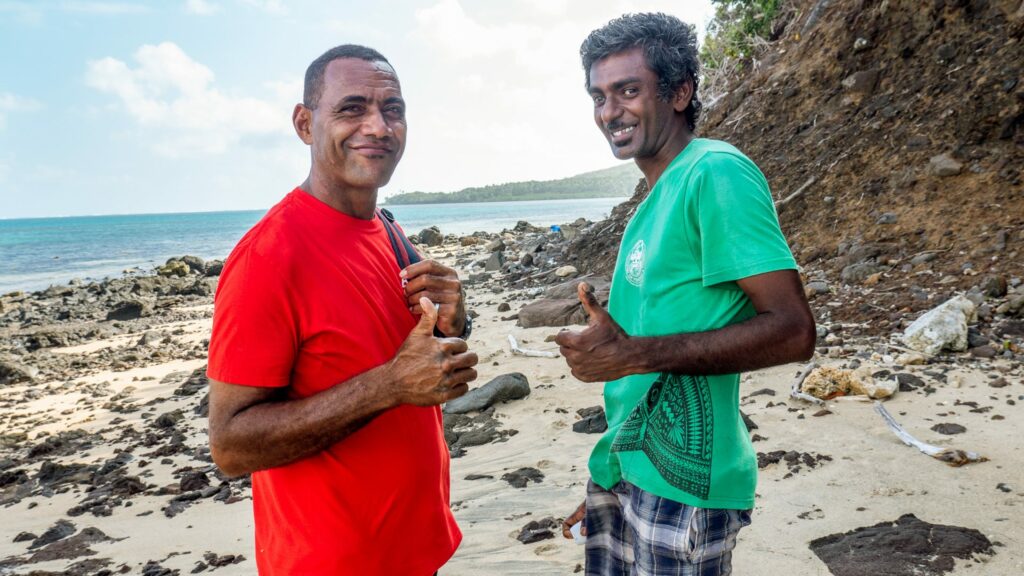
Nai tovo kei nai vakarau
These two words relate very closely to traditional lifestyle (na bula vakavanua) and responsibilities that one has to uphold those customs. These are central ideas in rural Fiji and is the reason why traditional customs and behaviours are adhered to strictly. This is one of the reasons we ask you to be as observant as you can of customs and etiquette in a village.
See the section on Village Customs and Etiquette for more details.
Being Culturally Appropriate in the Village
There are lots of traditional protocols and etiquettes in a Fijian village. On a practical level, by learning a few of these customs, it will ensure you make a great impression from the moment you arrive. You will learn plenty naturally by being receptive in a village, but here are just a few key ones to really impress and be as culturally appropriate within a tradtioal Fijian village setting, use this list as a bit of revision before arriving:
In the House
- Always take off your footwear (including flip flops) before entering any house, community hall or church.
- Immediately sit on the floor as soon as you enter any household, Fijian society works on physical levels and if you are openly standing taller that anyone you are placing yourself higher in household hierarchy. The rule of thumb is to be ‘at the level’ of anyone else in the room.
- Fijians consider it offensive to walk in front of a person seated on the floor, if you do need to pass someone who is seated please try to pass behind them physically stooping low and repeatedly say “tulou” (excuse me) softly (remember, it’s all about levels!).
- Fijians regard the head as sacred so try not to touch another person’s head, especially children.
- If taking an item from a shelf above someone’s head, first ask if it is ok to reach over their head and get it, stand up and grab the item, then immediately sit back down on the floor cross legged and ‘cobo’ three times (a clap with cupped hands). This shows respect as you stood higher than somebody and reached above their head. (If you get this one right, you’ll really impress!).
Around the Village
- Always dress modestly in the village. For women, this means shoulders and knees should be covered at all times in the village, including when swimming in the creeks or sea, and when walking on the beach.
- Politeness is central to Fijian society. Never rush past someone without saying hello. Even If you do not know them say “bula”(hello) or “yadra” (good morning). You do not need to do this in large towns, but you should in any village and rural location.
- You should remove your hat or cap when walking through the village, and objects such as backpacks, handbags, towels and cameras etc should be carried in your hands rather than over the shoulder (particulary when walking past the chief’s house).
- It is considered rude to be unnecessarily loud in a Fijian village so please try to refrain from whistling or shouting unless it is an appropriate setting to do so.
- Try to avoid walking on the village green, these are traditionally sacred places so best to stick to paths!
- It is extremely rare to see any public display of affection between men and women in Fijian society – holding hands, kissing or cuddling or even publicly talking 1-on-1 with somebody of the opposite sex for a long period of time. This would cause immense embarrassment for local people so we ask all volunteers to be very mindful of this.
In a Kava Session
- Sitting with your legs stretched out in front of you or with your knees up during kava ceremonies, meetings or when eating dinner is viewed as disrespectful. Whilst drinking kava, ask permission to stretch your legs and never point them at anyone or at the tanoa (kava bowl). When drinking grog, men will sit cross-legged, whilst women will generally sit with their feet to the side.
- If offered kava (yaqona), cobo once (clap with cupped hands), take the bowl, say bula, and drink it all in one gulp. Then hand the bowl back to the same person and clap three times saying vinaka (thank you).
- Make sure never to sit ‘above the bowl’ with the elders, sit with everyone else behind the mixer.
- Try not to turn your back to the elders or the wooden bowl used for mixing (tanoa).
Mealtime
- Meals are eaten while sitting cross-legged on the floor.
- Eat with your hands, using a spoon provided for more liquid based foods!
- In a communal meal with plenty of food on offer ‘buffet style’ in the middle of the mat, try to take what is in front of you rather than reaching across to plates further away from you.
- When sharing a meal, please remember to wait until grace has been said before eating.
- Once you are finished eating, wash your hands in the bowl provided and dry with the towel next to it.
- If you are finished, physically move yourself away from the table and sit somewhere else in the room, this will allow anyone else who is waiting to eat to jump right in and get eating!.
- As you move away from the meal, say ‘vinaka na kakana’ (thank you for the food) to those who prepared it

